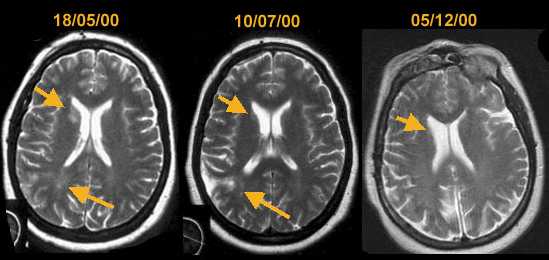César Avila*, Julio González*, Maria-Antònia Parcet*, Vicente Belloch**, and Daniel Geffner***
* Departament de Psicologia Bàsica, Clínica i Psicobiologia,
Universitat Jaume I
** Servicio de Radiologia, ERESA Castelló
*** Unidad de Neurología, Hospital General de Castelló
The present study deals
with a right-handed female polyglot suffering from a Foreign Accent Symdrome
( FAS) which affects her L1, but not her other languages learnt since the
age of 12. FT suffered different lesions as the result of a carotid
occlusion. Her L1 was Spanish, but she also had a good command of French,
English and Catalan even these were learnt after the critical period.
Aphasia tests did not reveal any other significant alteration in any language.
Results showed that different brain areas control articulation of L1 and
L2 learnt after the critical period.
Prosodic
Alterations
Evaluation
by Native Listeners

As observed in previous
patients with FAS, the post-trauma speech of FT in L1 (Spanish) showed
segmental and suprasegmental deviations from native performance that affected
articulation, utterance, segmental duration, and prosody. These impairments
were not evident in French, English and Catalan (L2). Comparing pre-trauma
versus post-trauma spontaneous speech, temporal measurements demonstrated
an overall slowness of the rate of articulation. Importantly, this effect
was specific of her native language only appearing in Spanish [t (116)=
7.34, p<.0001] but not in French (L2) [t(36)= .57, p=.570]. Difficulties
in proper sequencing and connecting of native speech movements was
patent in a sentence-repetition task.
Auditory and acoustical analyses revealed articulatory impairments
in the Spanish consonants apico-alveolar tap /r/, vibrant /r/, fricatives
/interdental/ and /s/, and the affricate /t?/. Impairment especially
arises in the ability to sequence speech movements when several of these
sounds are included in a same word (p.e. “zanahoria” /?anaoria/ [carrot],
“cereza” /?ere?a/ [cherry]). Spanish of FT is grammatical and perfectly
intelligible, but she shows difficulties in linking certain sounds across
words in connected speech, particularly the final /s/ of plural articles
with the following vowel (e.g. “los árboles” /los-arboles/ [the
trees]). No significant impairment was found for French as evaluted by
French native speakers.